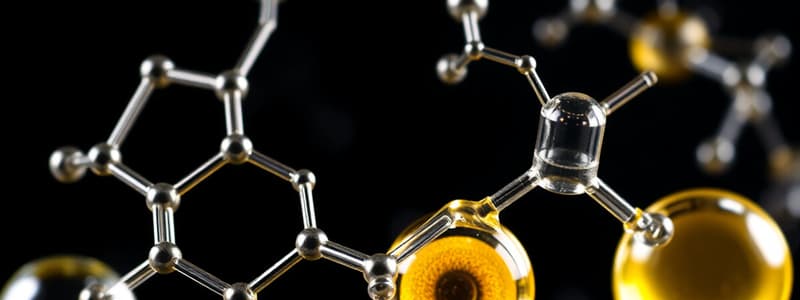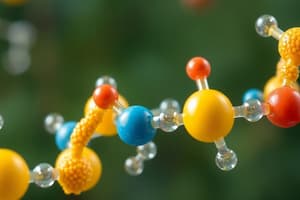Podcast
Questions and Answers
Which of the following elements is most commonly found in living things?
Which of the following elements is most commonly found in living things?
- Carbon (correct)
- Chlorine
- Sodium
- Nitrogen
What category do sugar and starch belong to?
What category do sugar and starch belong to?
- Proteins
- Carbohydrates (correct)
- Lipids
- Vitamins
Which of the following molecules is primarily responsible for energy storage?
Which of the following molecules is primarily responsible for energy storage?
- Nucleic Acids
- Carbohydrates
- Proteins
- Lipids (correct)
Which macronutrient is crucial for building body structures and aiding chemical reactions?
Which macronutrient is crucial for building body structures and aiding chemical reactions?
How many elements are generally needed for normal human growth?
How many elements are generally needed for normal human growth?
Which food source is primarily high in carbohydrates?
Which food source is primarily high in carbohydrates?
What type of mineral do you need in larger amounts for healthy body functions?
What type of mineral do you need in larger amounts for healthy body functions?
Which of the following plays a crucial role in bone formation?
Which of the following plays a crucial role in bone formation?
Flashcards
Most Common Elements in Living Things
Most Common Elements in Living Things
Carbon (C), hydrogen (H), and oxygen (O) are the most common chemical elements in living things.
Organic Molecules
Organic Molecules
Sugar, starch, fats, oils, waxes, and proteins are all examples of organic molecules because they contain carbon and hydrogen.
Nutrients
Nutrients
Essential nutrients needed for life processes.
Types of Nutrients
Types of Nutrients
Signup and view all the flashcards
Macronutrients
Macronutrients
Signup and view all the flashcards
Macrominerals
Macrominerals
Signup and view all the flashcards
Trace Elements
Trace Elements
Signup and view all the flashcards
Polymers
Polymers
Signup and view all the flashcards
Study Notes
Biological Molecules
- Living organisms require about 25 elements for normal growth
- Carbon (C), oxygen (O), and hydrogen (H) are the most common elements found in living things
- Organic molecules, including sugar, starch, fat, oil, wax, and proteins, are primarily composed of carbon and hydrogen
Nutrients Essential for Life
- Nutrients can be either organic or inorganic
- Organic nutrients contain carbon and hydrogen
- Examples: carbohydrates, lipids, proteins, and vitamins
- Inorganic nutrients are minerals
- Examples: calcium and iron
Organic Molecules and their Role in Nutrition
- Carbohydrates are a primary energy source for metabolism, found in rice, grains, potatoes, and fruits
- Proteins are structural components of the body and aid in chemical reactions (enzymes), found in meat, eggs, dairy, and legumes
- Lipids store unused chemical energy, found in vegetable oils, nuts oil, legumes, and some dairy products
- Nucleic acids are building blocks of DNA, essential for the development of organisms
Polymer and Monomer Structure
- Many biological molecules are polymers, long chains of building blocks called monomers
- Monomers are the basic units, while polymers are the larger structures
Molecular Structures of Biological Compounds
- Carbohydrates: Composed of monosaccharides (simple sugars) linked together
- Nucleic acids: Formed from nucleotides
- Proteins: Constructed from amino acids
- Lipids: Often contain fatty acids (sometimes with glycerol)
Essential Elements for a Healthy Body
- Minerals, those needed in large quantities are called macrominerals
- Minerals needed in smaller quantities are called trace elements
- All living organisms require 16 naturally occurring elements
- Plants need 18 elements; humans need 22 elements
- Examples of crucial elements and their roles:
- Calcium: crucial for strong bones and teeth, nerve conduction, muscle contraction, and blood clotting
- Phosphorus: plays a role in bone formation, storing and releasing energy (ATP)
- Magnesium: a component of bones and teeth, essential for enzyme function, and regulates nerve function
- Potassium: helps regulate nerve signals, muscle activity (heart rate), protein formation, and maintains acid/base balance in the body
- Sulphur: found in some amino acids
- Iron: essential for red blood cells, regulating oxygen transport
- Iodine: a major component of thyroid hormones, which regulate metabolism
Obtaining Minerals
- Plants absorb minerals directly from the ground using specialized root hairs, then transport them to other parts of the plant to form organic compounds
- Humans rely on plants for these nutrients
Vitamins
- Vitamins are organic compounds essential for normal growth and nutrition
- They are needed in small quantities since the body cannot produce them
- Vitamins are often categorized into water-soluble and fat-soluble, with differences in storage and requirement frequency
Studying That Suits You
Use AI to generate personalized quizzes and flashcards to suit your learning preferences.




